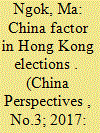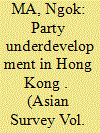| Srl | Item |
| 1 |
ID:
156080


|
|
|
|
|
| Summary/Abstract |
The China factor has always been a significant structural, ideological, and organisational factor in Hong Kong elections. Since 2003, the deepening of intervention by Beijing and its Liaison Office in Hong Kong meant that the China factor as an organisational force became increasingly salient in elections. It also drove more people, especially young people, to resist China’s control and take the road of supporting independence or self-determination. The 2016 elections showed more ostensible intervention by the Liaison Office, and independence became a new campaign issue. The China factor will continue to be an integral part of Hong Kong elections in years to come.
|
|
|
|
|
|
|
|
|
|
|
|
|
|
|
|
| 2 |
ID:
160425


|
|
|
|
|
| Summary/Abstract |
Twenty years after 1997, political parties in Hong Kong are still underdeveloped. The hybrid regime has posed major constraints, as there are no governing parties, and democratic development is slow. The parties have also found it difficult to respond to value changes toward radicalization, a new political identity, and post-materialism, with support shifting to new movement groups.
|
|
|
|
|
|
|
|
|
|
|
|
|
|
|
|
| 3 |
ID:
096599


|
|
|
|
|
| Publication |
2010.
|
| Summary/Abstract |
Business interests are overrepresented in Hong Kong's nominally democratic political institutions. Many in Hong Kong perceive this as evidence of the existence of "collusion between government and business," a phenomenon that has stirred public concerns in the city since its sovereignty transfer. Although anecdotal accounts abound, no systematic analysis has been conducted to evaluate the validity of this perception. In this article I use a rich firm-level dataset to offer the first systematic assessment of the effects of political connections on firm performance in Hong Kong. I define politically connected firms as firms that have stakeholders concurrently holding a seat on the Election Committee, a constitutional body that elects the city's chief executive. I found evidence, though not overwhelming, consistent with the "collusion" hypothesis: political connections do improve firm performance measured by return on equity and market-to-book ratio. The improvement is unlikely due to unobserved confounding factors such as firms' inherent ability. As for the origin of the political connections, the data show that a firm's economic power has little predictive value of its connections to the Election Committee. Rather, number of employees matters; firms that hire fewer workers were more likely to gain a seat on the 1997 Election Committee. This result may suggest that Beijing plays a more dominant role in the formation of political connections-that serve Beijing's co-optation needs rather than the interests of powerful firms that may have a desire to "capture" the state.
|
|
|
|
|
|
|
|
|
|
|
|
|
|
|
|
| 4 |
ID:
178449


|
|
|
|
|
| Summary/Abstract |
The political development in Hong Kong after 1997 displays certain similarities to that in Taiwan. This article uses the term "Taiwanisation of Hong Kong politics" to generalise this trend. A closer look at Hong Kong and Taiwan politics reveals that the essence of this "convergence" is the emergence of "exogenic infighting" that comprises two dimensions, political antagonism and ethno-nationalism. Indeed, "exogenic infighting" politics could be explicated largely by China's triadic leverage. By "localising" this leverage, the centrifugal forces in Hong Kong's constitutional design of autonomy activate two mechanisms, namely intensifying polarisation and mutual shaping, which eventually shape the political trajectories of Hong Kong.
|
|
|
|
|
|
|
|
|
|
|
|
|
|
|
|